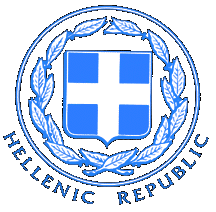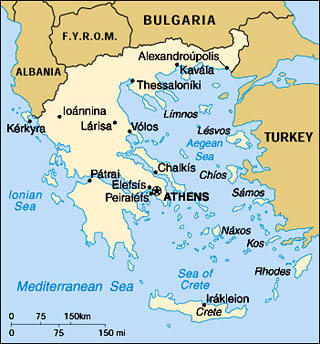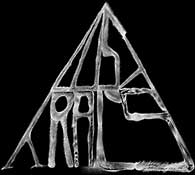| Home |  |
||||||||||
| Greece | |||||||||||
| In February 2001 Lost Trails launched a long term project to document in image and sound many of the locations and artifacts mentioned by Herodotus. From February until July 2000, Lost Trails photographer Shane Solow traveled through Greece to complete the first phase of this project. | |||||||||||
| Official Name: Hellenic Republic Capital: Athens (pop. 4M) Geography  Location: Mediterranean state at the tip of the Balkan Peninsula, in southeastern Europe, bordering Turkey to the east; Albania, Bulgaria and the Republic of Macedonia to the north; and surrounded by the Ionian and the Aegean seas. Location: Mediterranean state at the tip of the Balkan Peninsula, in southeastern Europe, bordering Turkey to the east; Albania, Bulgaria and the Republic of Macedonia to the north; and surrounded by the Ionian and the Aegean seas.Note: Strategic location dominating the Aegean Sea and the southern approach to the Turkish Straights. Area: Total Area: 131,940 sq. km Land Area: 130, 800 sq. km Terrain: Some 80% of the mainland is mountainous with ranges extending into the sea as peninsulas or chains of islands. Approximately 3,000 islands account for 19% of Greece's area. Cultivated land covers about 30% of the country's total area. Land Boundaries: Total 1,228 km, Albania 282 km, Bulgaria 494 km, Turkey 206 km, Republic of Macedonia 246 km Coastline: 13,676 km Climate: Temperate, Mediterranean with hot, dry summers and mild, wet winters. Spring is hot and autumn long and warm. The lowest temperatures are recorded between December and February, and the highest in July and August. In general, Greece enjoys over 250 days of sunshine annually. Natural Resources: Bauxite, lignite, magnesite, petroleum, marble, iron ore, lead, zinc, nickel, salt, hydropower potential. Land use: 21.1% arable land; 40% meadows and pastures; 20% forests and woodland; 18.9% other. Topography: Greece, the southernmost extremity of the Balkan peninsula, is a mountainous, stony country with a highly indented and crenelated coast. According to a Greek myth, when god created the world he distributed all the available soil through a sieve and when he had provided every country with enough of it he tossed the remaining stones from the sieve over his shoulder-- and there was Greece. More than two thirds of the country is classified as hilly and mountainous. The Pindos range traverses the Greek mainland from NW to SE dividing it in two. the Greek mainland coastline is 4,000 km long while 9,841 islands, 114 of which are inhabited, add another 11,000 km of coastline. Greece is divided into ten regions of which Macedonia is the largest with an area of 34,177 sq. km and a population of 2,263,099. The highest Greek mountain is Mount Olympus (2,917 m), believed to be the seat of the twelve gods of ancient Greek mythology. The largest river is Aliacmon (297 km). The largest city and capital is Athens, with a population of over 4M. Piraeus is the main port. The second largest city, Thessaloniki, capital of Macedonia, with a population of nearly 1M, is an important seaport functioning as the gateway to the Balkans and a major economic and cultural center for the whole of northern Greece. Time: 2 hours ahead of GMT in winter. 3 hours ahead of GMT in summer. Flora: Trees include white poplars, spearheaded cypresses, chestnut, pine, fir and olive trees. Of special beauty are the cultivated and wild flowers of Greece, many of which are mentioned in classical poetry and mythology, such as evosmon, anemone, violets, tulips, peonies, narcissus, parthenium, primrose and chamomile. Fauna: Wild animals include boar, bear, wild cat, brown squirrel, jackal, fox, deer and wolf. A rare goat is found in Crete. 358 species of birds are found throughout Greece, two-thirds of which are migratory. Among the birds of prey are the golden and imperial eagle, and several species of falcons. Other indigenous varieties of birds are the owl, pelican, pheasant, partridge, woodcock and nightingale. Marine Fauna: Some 246 species of marine life have been identified in Greek seas. Among the best known are red mullet, lobster, squid, octopus, shrimp, crab, oyster, mussel and cockle. River fish are rare. Dolphins, familiar in the legends and sculpture of antiquity, are still present in the Greek seas. Source: Embassy of Greece, Washington, DC, USA The World Factbook, Central Intelligence Agency, USA |
|||||||||||
| Herodotus project | |||||||||||
| Music | |||||||||||
 |
|||||||||||
|
|
|||||||||||